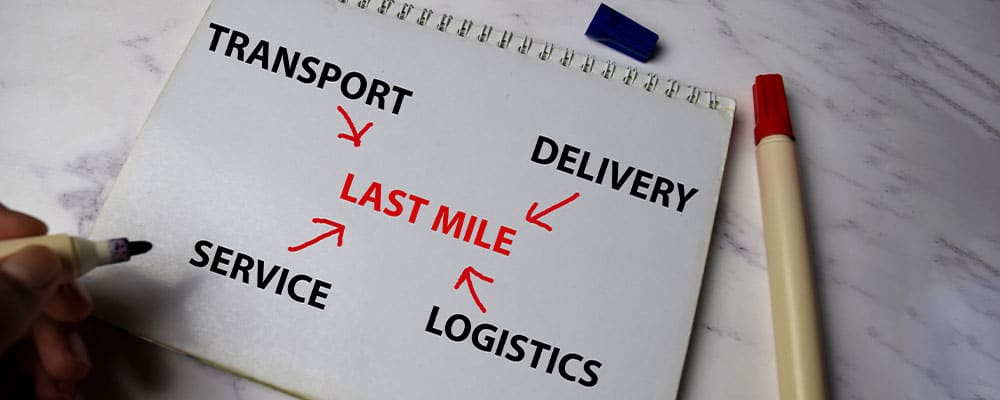Crucial Role of Last-Mile Delivery
Last-mile delivery is paramount in the complex logistics and supply chain management world. It’s the final, crucial link in the logistics chain, marking when your products finally reach your customers.
Despite its importance, last-mile delivery is fraught with challenges, making it one of the supply chain’s most complex and cost-intensive components. Every aspect brings unique logistical hurdles, from planning optimal routes to managing diverse customer locations and coordinating delivery personnel.
Moreover, the rise of next-day and same-day delivery services has heightened customer expectations. Customers today demand swift, convenient deliveries with complete visibility from dispatch to their doorstep.
Addressing these complexities is where the GPS tracking system Dubai comes into play. In our increasingly digital world, these innovative systems have become a game-changer. GPS tracking systems have revolutionized last-mile logistics by providing real-time tracking and insightful data analytics, boosting efficiency, slashing costs, and enhancing customer satisfaction.
Challenges of Last-Mile Delivery
Last-mile delivery is fraught with complexities and challenges owing to its very nature. Let’s delve into these issues more thoroughly.
Unpredictable Traffic Conditions
One of the most significant hurdles in last-mile delivery is traffic congestion. Cities are notorious for their unpredictable and often heavy traffic. Delivery personnel needs help navigating these congested roads, leading to delayed deliveries.
Changing Weather Conditions
Weather also plays a substantial role in determining the efficiency of the last-mile delivery. Extreme weather conditions like heavy rain, snow, or storms can halt delivery, causing unplanned delays and disrupting the delivery schedule.
Varied Delivery Locations
Last-mile delivery involves reaching out to multiple customers located in different areas, often on the same day. These customers might reside in densely populated urban areas, remote rural regions, or elsewhere. The diversity of these delivery locations adds another layer of complexity to the process.
Managing Delivery Personnel
Coordinating with multiple delivery personnel can be a demanding task. It’s essential to keep track of each delivery person’s progress, manage their routes, and ensure they’re meeting their delivery schedules. Any mismanagement can lead to a ripple effect, causing delays and even missed deliveries.
Rising Customer Expectations
Today’s customers are more demanding than ever. They expect deliveries to be made swiftly and within a stipulated timeframe. Any delay or error can lead to dissatisfaction, impacting customer loyalty and retention.
Increased Cost
The last mile of delivery is the most expensive part of the supply chain, often accounting for up to 28% of total logistics costs. Factors like fuel prices, vehicle maintenance, and wages of delivery personnel add to the cost.
Environmental Impact
Delivery trucks contribute significantly to carbon emissions. There is increasing pressure on companies to reduce their carbon footprint, making it imperative to optimize delivery routes and reduce unnecessary mileage.
Failure to effectively manage these challenges can severely impact a company’s reputation and customer satisfaction. Hence, optimizing last-mile delivery is not a choice but necessary in today’s competitive business environment.
Role of GPS Tracking in Last-Mile Delivery
So how can we improve efficiency and effectiveness in last-mile delivery? The answer lies in GPS tracking systems. Here’s how:
Real-Time Monitoring
A GPS tracking system provides real-time updates about your fleet, which is crucial for timely decision-making. Whether a vehicle breakdown or an unexpected traffic jam, being armed with real-time information allows swift action and minimizes delivery delays.
Route Optimization
One of the greatest strengths of GPS systems is their ability to find the best routes for delivery. GPS systems consider factors such as current traffic, road closures, and distance, thereby avoiding wasted time and ensuring deliveries are made as efficiently.
Efficiency in Operations
With GPS tracking, businesses can monitor and manage idle time, ensuring deliveries are made without unnecessary delays. By identifying patterns in delivery routes and times, businesses can streamline their operations and make them more efficient.
Trakker.ae: Your Partner in Efficient GPS Tracking
If you’re considering incorporating a GPS tracking system Dubai into your last-mile delivery process, Trakker.ae is your go-to solution. Our advanced telematics systems offer reliable, accurate, and real-time data that can help optimize your delivery operations.
With a user-friendly interface and an efficient customer support system, we ensure you can focus on your core business operations. At the same time, we take care of your fleet management needs.
